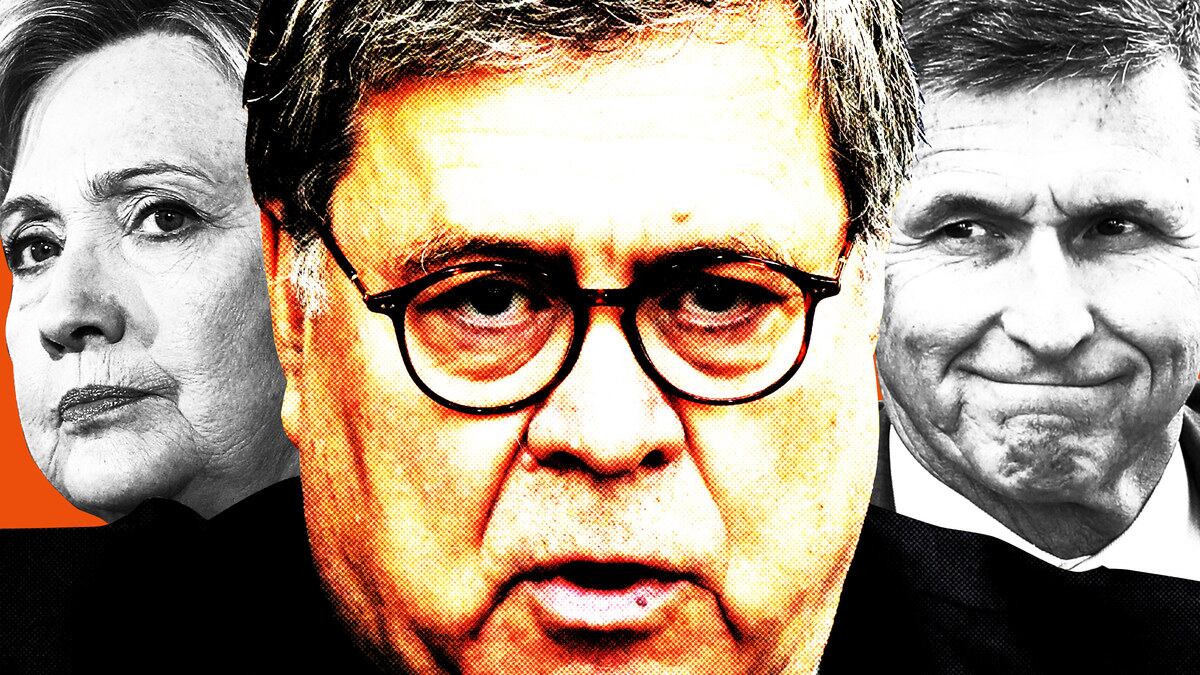When Supreme Court Justice Louis Brandeis famously declared “sunlight is the best of disinfectants,” he wasn’t prescribing it for a pandemic, like Donald Trump, but addressing the inherent value of disclosing facts about how powerful institutions, particularly the justice system, operate. But now Donald Trump’s attorney general is trying to force a federal judge to dismiss felony charges that the Department of Justice brought against Trump’s former national security adviser, Mike Flynn, and that he pleaded guilty to, while keeping the court and the public entirely in the dark about the reasons for the government’s about face.
Flynn twice admitted under oath to lying to the FBI about calls with the Russian ambassador in 2016, during which he made clear that the new administration planned to go easy on the Russians in the immediate wake of their interference in the 2016 election on Trump’s behalf. Flynn also admitted to lying to investigators about work he had done for Turkey. Yet Barr wants the appellate court to order Judge Emmet G. Sullivan to grant a motion to dismiss the charges against Flynn, purportedly because he is not guilty of the charges and should never have been indicted.
Barr’s motion is a transparent effort to offer fuel for Trump’s conspiratorial “Obamagate” claims, and to provide grist for the president’s assertion that Flynn and, by extension, the president were victims of a vast and shadowy conspiracy that is supposedly “worse than Watergate.”
The DOJ is not only trying to end its own case against Flynn, but is also trying to get an appellate court to issue an extraordinary order, called a writ of mandamus, that would require Sullivan to grant the the DOJ’s motion to dismiss without any inquiry into circumstances giving rise to the DOJ’s sudden reversal of position.
Under the governing rule, the DOJ requires leave of court to effectuate the dismissal of Flynn’s indictment and Sullivan has indicated that he intends to take his responsibility to review the motion with the seriousness that the rule calls for—including by appointing a respected former judge to set forth arguments in opposition to the motion for the court’s consideration, given that the government itself is, for obvious reasons, not in a position to do so.
By bringing a motion purportedly founded on newly discovered evidence of Flynn’s innocence before the court, Sullivan compellingly contends, Barr necessarily invited an inquiry into that evidence, as well as the exceedingly weak legal arguments the DOJ has advanced in favor of dismissing the charges. If the DOJ and Flynn actually believe their contention that Flynn is a victim, not a criminal, one would expect them to favor a searching inquiry into that misconduct. Therefore, the fact that the DOJ is joining Flynn in seeking an order categorically barring such an inquiry raises a huge red flag.
Sullivan’s counsel, Beth Wilkinson (who represented now Justice Kavanaugh during his confirmation hearings) made just that point in her brief to the appellate court, explaining that the DOJ’s unprecedented motion raises a number of serious questions, including and especially, whether the “presumption of regularity” courts normally accord to prosecutorial decision-making should not apply. Though clothed in the language of careful lawyering, Sullivan is advancing the very reasonable concern that, in the guise of saving Flynn from the consequences of prosecutorial overreach, Barr is actually seeking to misuse the courts as a mechanism for a propaganda campaign to discredit the work of Robert Mueller and his investigative team.
The issue now before the appellate court is not whether or not the DOJ’s motion will be ultimately granted. In fact, there are strong legal arguments that a trial judge in Sullivan’s position has very little (if any) leeway to deny a DOJ motion to dismiss an indictment that is unopposed by the defendant (although the issue is unsettled and it is unprecedented for the DOJ to bring such a motion after a defendant has admitted his guilt under oath and entered a guilty plea). Rather, the issue is whether the appeal court should allow the trial court simply to render a decision on the motion before addressing the legal questions it presents.
Mandamus is an extraordinary remedy, particularly in this case, where it would, as Sullivan’s counsel puts it, “short-circuit” the entire normal process of developing a record, and reaching a decision, at the trial court. Federal appellate courts rarely grant such relief precisely because they usually want to have the benefit both of a fully developed set of facts and the trial judge’s response thereto before conducting their own review.
Furthermore, mandamus is rarely granted unless allowing the process to go forward in the lower court risks some immediate harm or prejudice to a party. Indeed, the DOJ recently refused to support a grant of mandamus relief even in a case where the risk of prejudice was obvious and clear. Another D.C. trial judge granted the motion of a right-wing activist gadfly organization, Judicial Watch, to interrogate Hillary Clinton under oath, yet again, over (yes, you guessed it) her emails. The DOJ agreed with Clinton that the trial court erred in granting the motion, yet it refused to support her mandamus application to the appellate court because Barr’s lawyers deemed the circumstances insufficiently “extraordinary.”
By contrast, in the Flynn case, allowing the trial court to take the time to scrutinize and rule upon the DOJ’s dismissal motion in due course will not prejudice the defendant even one iota. He has been and remains free, as he has been since being indicted, and will not spend a night in custody no matter how long it takes the trial court to review the DOJ’s motion.
The only danger in conducting a normal-course review of the merits of the DOJ’s motion is that of too much sunlight. That is, the searching inquiry that Sullivan plans to undertake just may end up proving that the contentions of Barr’s most vigorous critics are true, and that it is the current Trump DOJ—not Obama “holdovers” or the “deep state—who have corrupted the justice system for political ends. Furthermore, as Sullivan has also explained, the inquiry may address whether Flynn committed perjury when he twice admitted his guilt to the court, under oath.
One year ago, the Supreme Court ruled against Trump’s effort to add a citizenship question to the census questionnaire. Chief Justice Roberts, who cast the deciding vote with the court’s liberal members, wrote a decision making clear that, while he was sympathetic to Trump’s effort to add the question, he was constrained from doing so by evidence that had emerged demonstrating the government’s stated purpose, which was to further enforcement of the Voting Rights Act, was pretextual and (though Roberts did not say so squarely) mendacious.
That evidence came to light only because a diligent and careful trial judge insisted that the government comply with his orders to disclose evidence.
It remains highly unlikely that Flynn will spend a night in jail, regardless of his culpability. But having made a motion seeking to end the Flynn case, the DOJ should not be able to avoid careful judicial scrutiny along with a public airing of the facts at issue.
Justice Brandeis’s words remain as true today as they were decades ago: Sunlight is the best of disinfectants.






